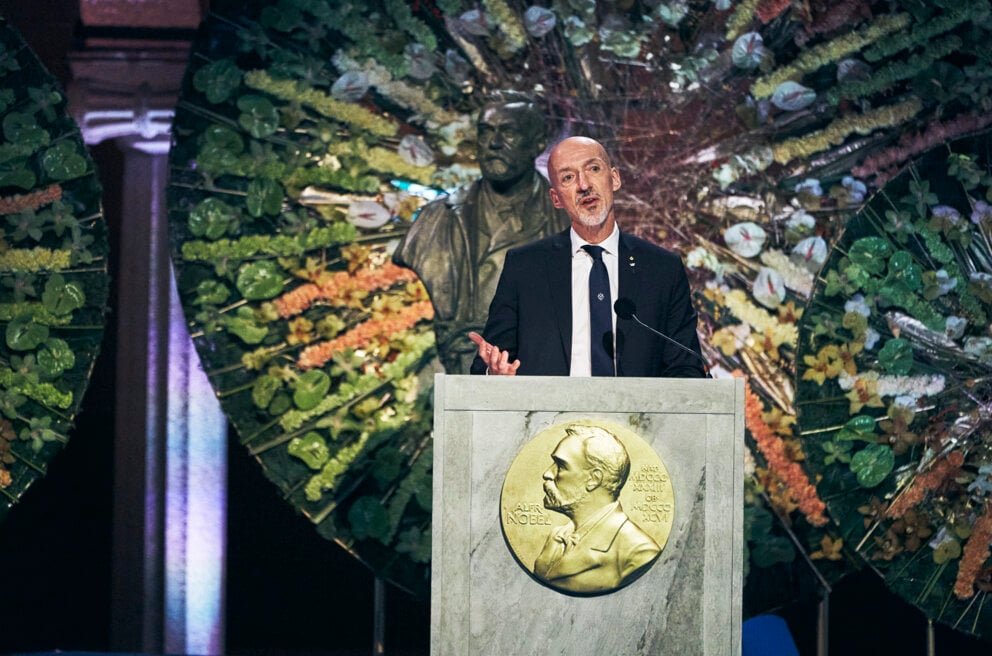Award ceremony speech

Professor Peter Somfai delivering the presentation speech for the 2021 Nobel Prize in Chemistry.
© Nobel Prize Outreach, photo: Dan Lepp
English
Swedish
Presentation Speech by Professor Peter Somfai, Member of the Royal Swedish Academy of Sciences; Member of the Nobel Committee for Chemistry, 10 December 2021.
Your Majesties, Your Royal Highnesses, Esteemed Nobel Prize laureates, Ladies and Gentlemen,
We all have an intimate relationship with molecules, but most of the time we are just not aware of it. It might be medicines, agrochemicals, molecules that can store and relay information or that can convert sunlight into electricity. Our knowledge of how to design and make such molecules in an efficient and sustainable manner is closely linked to the progress of our society.
Many organic molecules can exist as non-identical mirror images of each other. It is just like with our hands: identical, but mirror images of each other. Such molecular mirror images can have different properties. For example, one mirror image of a medicine can have the desired effect while the other has an undesired or no effect at all. There is thus a need to be able to selectively produce only the mirror image of a molecule that has the desired property. Today this can, for example, be achieved by using enzymes or asymmetric metal catalysis. A catalyst is a substance that accelerates the rate of a chemical reaction, but it is not consumed and remains unaffected. It is a very beautiful concept that is central to chemistry. The formation of almost all molecules that we are made of and use in everyday life involves catalysis.
Enzymes consist of several hundred amino acids, while only a few of them are responsible for the catalytic activity. Benjamin List showed that the complexity and activity of an enzyme could be reduced to a single amino acid, l-proline. This amino acid, a small organic molecule, is able to catalyse the same reaction as the enzyme and selectively produce only one mirror image of the product.
In asymmetric metal catalysts, the metal atom is responsible for the catalytic activity by activating the starting material. These catalysts are sensitive and the metal can be harmful to the environment. David MacMillan designed a small organic molecule, an imidazolidinone, and demonstrated that it achieves similar activation and efficiency in the Diels–Alder reaction as a metal catalyst, selectively producing only one mirror image of the product. He thus showed that such catalysis can be achieved without the need of a metal atom activation.
The work by Benjamin List and David MacMillan in the year 2000 resulted in a turning point; there is a clear before and after. They conceptualised the area of organocatalysis and have provided organic chemistry with a powerful tool for selectively making only one of the two possible mirror images of organic molecules. Since then, the research area has exploded and, as a result, we today have a number of small organic molecules that catalyse many different reactions. These catalysts can be used to manufacture molecules for our society; organocatalysis also holds great promises as a sustainable technology.
Benjamin List and David Macmillan:
Developments in organic synthesis that clarify new principles for inducing reactivity and controlling reaction pathways are central to the advancement of the discipline. Your work on asymmetric organocatalysis is a pioneering contribution to the area and has provided organic chemistry with a new powerful tool: the third pillar of catalysis. It is a truly great achievement. On behalf of the Royal Swedish Academy of Sciences, it is my great privilege to convey to you our warmest congratulations.
Copyright © The Nobel Foundation 2021
Nobel Prizes and laureates
Six prizes were awarded for achievements that have conferred the greatest benefit to humankind. The 14 laureates' work and discoveries range from quantum tunnelling to promoting democratic rights.
See them all presented here.
